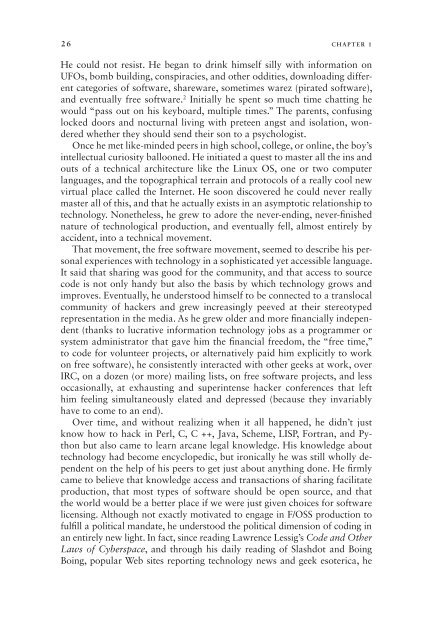V2TXZi
V2TXZi
V2TXZi
You also want an ePaper? Increase the reach of your titles
YUMPU automatically turns print PDFs into web optimized ePapers that Google loves.
26 CHAPTER 1<br />
He could not resist. He began to drink himself silly with information on<br />
UFOs, bomb building, conspiracies, and other oddities, downloading different<br />
categories of software, shareware, sometimes warez (pirated software),<br />
and eventually free software. 2 Initially he spent so much time chatting he<br />
would “pass out on his keyboard, multiple times.” The parents, confusing<br />
locked doors and nocturnal living with preteen angst and isolation, wondered<br />
whether they should send their son to a psychologist.<br />
Once he met like- minded peers in high school, college, or online, the boy’s<br />
intellectual curiosity ballooned. He initiated a quest to master all the ins and<br />
outs of a technical architecture like the Linux OS, one or two computer<br />
languages, and the topographical terrain and protocols of a really cool new<br />
virtual place called the Internet. He soon discovered he could never really<br />
master all of this, and that he actually exists in an asymptotic relationship to<br />
technology. Nonetheless, he grew to adore the never- ending, never- � nished<br />
nature of technological production, and eventually fell, almost entirely by<br />
accident, into a technical movement.<br />
That movement, the free software movement, seemed to describe his personal<br />
experiences with technology in a sophisticated yet accessible language.<br />
It said that sharing was good for the community, and that access to source<br />
code is not only handy but also the basis by which technology grows and<br />
improves. Eventually, he understood himself to be connected to a translocal<br />
community of hackers and grew increasingly peeved at their stereotyped<br />
representation in the media. As he grew older and more � nancially independent<br />
(thanks to lucrative information technology jobs as a programmer or<br />
system administrator that gave him the � nancial freedom, the “free time,”<br />
to code for volunteer projects, or alternatively paid him explicitly to work<br />
on free software), he consistently interacted with other geeks at work, over<br />
IRC, on a dozen (or more) mailing lists, on free software projects, and less<br />
occasionally, at exhausting and superintense hacker conferences that left<br />
him feeling simultaneously elated and depressed (because they invariably<br />
have to come to an end).<br />
Over time, and without realizing when it all happened, he didn’t just<br />
know how to hack in Perl, C, C ++, Java, Scheme, LISP, Fortran, and Python<br />
but also came to learn arcane legal knowledge. His knowledge about<br />
technology had become encyclopedic, but ironically he was still wholly dependent<br />
on the help of his peers to get just about anything done. He � rmly<br />
came to believe that knowledge access and transactions of sharing facilitate<br />
production, that most types of software should be open source, and that<br />
the world would be a better place if we were just given choices for software<br />
licensing. Although not exactly motivated to engage in F/OSS production to<br />
ful� ll a political mandate, he understood the political dimension of coding in<br />
an entirely new light. In fact, since reading Lawrence Lessig’s Code and Other<br />
Laws of Cyberspace, and through his daily reading of Slashdot and Boing<br />
Boing, popular Web sites reporting technology news and geek esoterica, he


